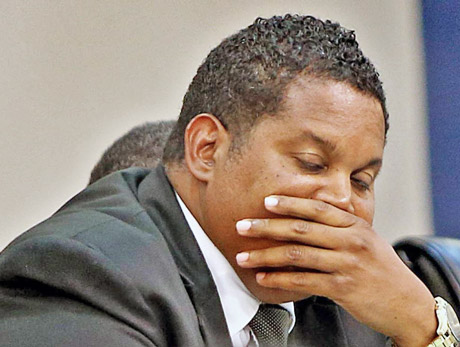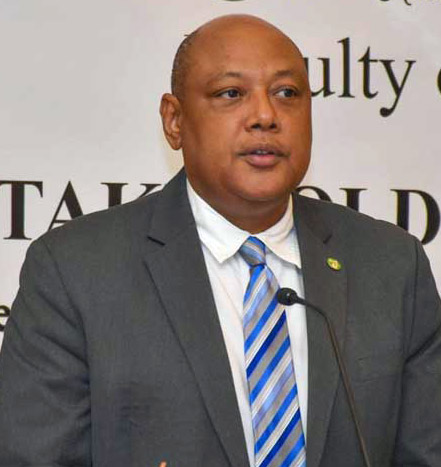
Port-of-Spain – Opposition Leader Kamla Persad-Bissessar on Monday slammed what she described as an “outrageous” Cabinet reshuffle by Prime Minister Dr Keith Rowley, while insisting Darryl Smith must resign.
She also insisted Rowley’s decision to move Smith to the Housing Ministry (as minister in the ministry) from his lead role in the Sport Ministry was a promotion in the light of calls for him to sack his controversial minister. Following calls for Smith to be fired, Rowley instead moved the controversial Sport Minister to the Housing Ministry as a minister while the Prime Minister himself takes charge of the Housing portfolio.
On Sunday Persad-Bissessar described the government as one of “sex, lies, and ferry-tales”, noting the country had passed the stage of questioning if Smith should be fired as a minister. Her statements followed in the wake of revelations by the Sunday Express of sexual allegations made by Carrie-Ann Moreau, Smith’s former personal secretary, in her witness statement in support of her complaint of wrongful dismissal at the Industrial Court. The complaint was settled, and Moreau awarded (TT) $150,000 in damages in a non-disclosure agreement.
“With every second that passes as he (Smith) sits in the government and as an MP in Diego Martin, is an insult to all women and the men who stand beside them as equals. The behaviour described by the young woman (Moreau) is reprehensible, and he should be immediately dismissed from public office. He should not only be fired as a minister but he should also be removed as an MP,” Persad-Bissessar said.
She noted the disclosures in the report spoke to Moreau’s experiences with Smith at his constituency office.
“Is the minister using the MP’s office to prey on vulnerable women seeking help? Further the question must be asked, ‘Has this been the experience of any other women who have sought his help?’ In light of these questions

Persad-Bissessar pointed out that as Prime Minister she took a zero-tolerance approach with members of her Cabinet and mandated them to ensure that they maintained the highest standards of conduct in the execution of their ministerial responsibilities.
“It is completely unacceptable. Darryl Smith’s actions must be roundly condemned, and measures must be put in place for public monies to be repaid. This is a matter that should not be taken lightly, and I reiterate that he must be held personally accountable,” stated Persad-Bissessar.
She noted Smith’s alleged behaviour amounts to misbehaviour in public office.
“...By virtue of assuming a role in public office and taking the oath to serve the people of Trinidad and Tobago, he should have maintained the highest standards of behaviour and uphold the integrity of the office. Most working women know what it is like to be faced with some form of sexual inappropriateness in the workplace. This is unacceptable. As a country, we must ensure that our mothers, daughters, and wives can advance themselves without fear of sexual advancements by those in authority. This is an issue we must face head-on,” she stated.
On Monday Persad-Bissessar was again calling for Smith’s removal following Rowley’s Cabinet reshuffle.
Said Persad-Bissessar: “You do not reward wrongdoing. Darryl Smith should have been totally removed from the government; he should not be sitting there and recycled into another position of authority. What about the women in HDC (Housing Development Corporation), in the Ministry of Housing, how will he continue to function as an MP when it is we have revelations that a woman went to him for assistance in his office and we hear these accusations of harassment?”
Persad-Bissessar said this reshuffle was also insulting to the people, declaring that Rowley, “Should pick up his pack of jokers and go”.
The woman’s rights group Womantra also indicated it had no confidence in the minister and has called on Rowley to fire Smith.
Amanda McIntyre, Womantra co-director stated in the interest of transparency and accountability to the citizens of Trinidad and Tobago, a full investigation into the matter should take place.
Asked by the media whether Smith should be fired given the controversial sexual harassment allegations in which he is embroiled, McIntyre replied: “Yes, we continue to say that persons occupying public office should not only submit to due process, but should also uphold the integrity of those offices.”
The group had no confidence in Smith, she stated: “…He has damaged, perhaps irreparably, any confidence we could have had in him. If we are seeking to address critical aspects of our culture regarding the agency of women and girls, we need persons in office who not only say these are their interests but show that in how they conduct themselves. Further, it is an entirely bad example for the nation’s children.”
McIntyre said it was insulting to all citizens of Trinidad and Tobago that State monies were used to settle this sex suit.
“We have persons who are supposed to operate as leaders, constantly embarrassing their offices by their indiscretion and Trinidad and Tobago as a nation pays for it,” she stated.
Womantra also expressed “grave concern” via its Facebook page over the allegations of sexual misconduct against Smith by several members of staff, and on the Office of the Attorney General’s decision to seal a court matter between the minister and a complainant who received a settlement of $150,000.
“Particularly glaring gaps in our legislation, noted by former head of the Public Service Reginald Dumas, reveal that it is not unlawful for ministers to engage sexually with their subordinates, despite the unequal power dynamic and increased likelihood of victimisation and job insecurity for non-compliance. We can no longer rely on an abstracted code of ethics to guide those in power. There must be firm rules and guidelines in place at the State and private sector levels to avoid abuses of power in all its forms,” it stated.
Womantra noted the public must also feel confident that representatives of the State who abuse their power are not above the law, and there is transparency and accountability when ministers and other representatives of the State are accused of violating the rights of citizens.
“This is particularly important when allegations are sexual in nature. We await the responses of both the Attorney General and the Prime Minister on this matter and hope that decisive action will be taken against the Sport Minister, with all pending matters being fully investigated,” it stated.
weighty returns in tiny Guyana…
tax laws should be revised

Exxon Mobil Corp. got such a “favorable” deal from Guyana, home to the biggest new deepwater oil play, that the tiny South American country should rewrite its tax laws, the International Monetary Fund said.
While Guyana should honor the existing deal, future contracts should ensure the state gets a higher portion of crude proceeds, the fund said in a report seen by Bloomberg News. The country, South America’s third poorest with an average per capita income of around $4,000, has little experience of dealing with multinational behemoths such as Exxon.
Terms of the 2016 contract “are relatively favorable to investors by international standards,” the IMF said in a report prepared for Guyanese officials. “Existing production sharing agreements appear to enjoy royalty rates well below of what is observed internationally.”
IMF officials have visited the nation multiple times over the past nine months as they help improve its legal, fiscal and regulatory frameworks before Exxon commences oil production in 2020. Guyana, whose entire population of 770,000 is about half the size of Philadelphia, has become one of Exxon’s five key global projects for the next decade due to the sheer size of its oil endowment.
“Government take is generally lower in frontier plays than in established areas as governments need to incentivize companies to undertake high-risk exploration,” Exxon said in a statement, citing a Wood Mackenzie Ltd. study that found Guyana in the middle range of the 148 jurisdictions evaluated.
With companies such as Total SA, Tullow Oil Plc and Repsol SA also exploring for oil in Guyana’s waters, time is of the essence. “The government could consider issuing a temporary moratorium on new licensing until a new fiscal regime is in place,” the IMF said.
Exxon’s total acreage in Guyanese waters covers 11.5 million acres, equivalent to about 2,000 leases in the U.S. sector of the Gulf of Mexico. Exxon leads a partnership group that includes Hess Corp. and China’s Cnooc Ltd. The IMF declined to comment beyond the report.
$700 Million
Expectations are high. Government revenues from Exxon’s first project, which involves pumping less than 15 percent of the crude found to date, are expected to peak at $700 million a year by the late 2020s, equivalent to the country’s tax take in 2016.
The government has no plans to change the Exxon contract, Mineral Resources Minister Raphael Trotman said by email. The terms cover the Stabroek Block where Exxon struck oil through its Liza-1 well in 2015. However, the government will have different terms for future contracts, Trotman said.
Exxon’s deal was procured partly because it entered the country in 1999, when the Guyanese coastline wasn’t regarded as promising oil territory by most of the industry. “It is not unusual to see more favorable fiscal terms for early investments in the extractive industries,” the IMF said in its report, which was delivered to Guyanese leaders in November.
Resource Curse
To reap the benefits of oil, Guyana faces a familiar challenge: gaining as much revenue as possible without deterring investment. Politicians say they want to set up a sovereign wealth fund and avoid the resource curse – the phenomenon whereby discovery of a valuable commodity stunts growth in other sectors of an economy, fueling corruption, conflict and currency swings that ultimately strand most of the population in poverty.
Either way, oil is poised to profoundly change Guyana, a country the size of Kansas that was colonized by the Dutch and British before obtaining independence in 1966. Its economy currently relies on agriculture and gold mining.
With first oil due in 2020, just five years after it was discovered, the government has much to do, the IMF said in the report. Exxon’s deal with Guyana gave it the lowest average effective tax rate among nine projects in countries that include Norway, Brazil, Peru and Trinidad & Tobago.
Cost Deductions
Open Oil, a Berlin-based company that advocates contract transparency, also found Guyana’s share of the Stabroek was low compared with both established and early-stage producing countries. Guyana will receive 52 percent of positive cash flow over the life of Exxon’s initial project, compared with between 63 percent and 72 percent for developments in Liberia, Mauritania, Ghana, Senegal and Papua New Guinea, it said in a March report.
The Exxon contract, which was published on a government website last year, provides Guyana with a 2 percent royalty on sales and 50 percent of profitable oil, once costs are repaid. Exxon and its partners can only deduct three-quarters of their costs each year, giving the government some cash in the first years of the project.
The IMF report recommends that Guyana:
• employ a more progressive tax regime so that the government receives a higher share of profits as projects earn more
• consider eliminating interest expenses from the project’s costs to avoid “abusive use of debt”
• introduce tighter ring fences to avoid costs being shared around multiple fields
• bulk up its regulatory capability
“We intend on implementing as many of the recommendations as possible,” Trotman, the minister, said. In so far as the Exxon-led group’s contract is concerned, “the government has no intention of revisiting it at this time. For future contracts we certainly will be having updated terms.”


